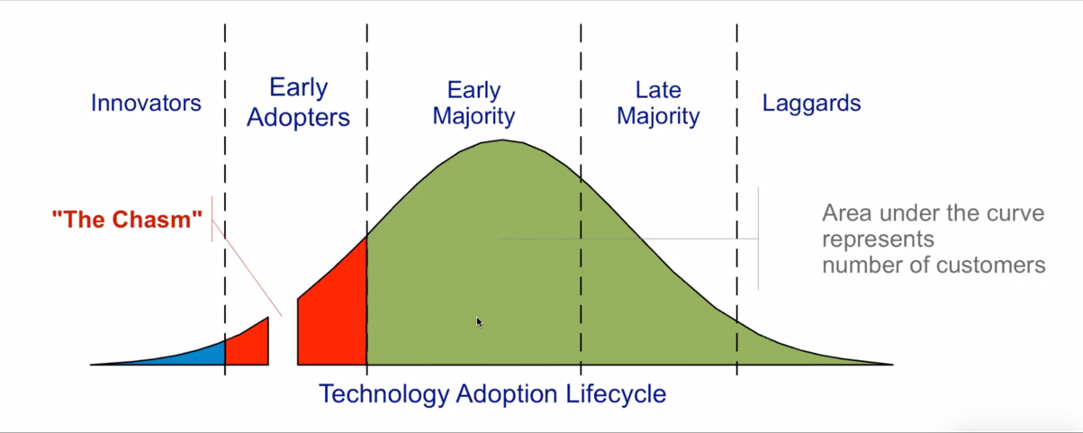OPUS Event: Technology and Publishers: Making It Work
by Caroline Guillet
On Tuesday 19 May 2020 the Oxford Publishing Society hosted an online event: Technology and Publishers: Making It Work. This event was attended remotely through Zoom. The speakers, (also online) were: Nick Barreto, Technology Director, Canelo, Rebecca Reddecliffe, Product Manager, Wiley, Nick Robinson, Co-founder, LearnJam and Laura Summers, Co-founder, BookMachine.
Here follows a report and summary of the presentations and the Q and A section.
Nick Robinson (LearnJam): honing digital skills and technical expertise
10 years ago, Nick decided to ‘get out of print’ by choice – as opposed to reacting to the covid-19 situation which forced many publishers to turn to digital solutions.

In the graph shown here, he describes innovators as individuals able to accomplish great things almost instantly, early adopters as willing to change, but early and late majorities failing to take initiatives. Nick could not stress enough how technology should be seen as an opportunity for publishers and not a threat. In other words, while publishers might worry about quality issues, the use of technology is actually an efficient way to welcome curiosity and creativity.
Rebecca Reddecliffe (Wiley): communicating with the same language
The publishing industry is changing, that is a fact. The demand is constantly increasing for open-access resources and support to researchers. Rebecca’s belief is to draw an understanding of the audience and market from publishers and then send this data to tech teams for implementation. However, both teams should collaborate and be able to exchange in the same language by staying clear of acronyms and jargon. To bring down those barriers, Rebecca suggests a general meeting with both teams as an expectation ‘kick-off’ where argot can be addressed.
Technology training sessions are available everywhere – some for free – for people wishing to upskill and understand their co-workers better.
Finally, when creating a digital solution or product, the main focus must be on the customer, both from the technical and publishing sides of the table.
Nick Barreto (Canelo): thinking like a programmer
When e-books emerged, publishers jumped on the trend because they had to, and almost as an after-thought. The key to success for Nick is to think like a programmer, as more than allowing efficiency, technology can also help to avoid common human mistakes. Limiting risks by following the same model is an old but popular publishing practice; Canelo, his company, is breaking with tradition by being digitally focused and innovative.
Self-teaching in technology is possible; whether to understand or make use of it. A free course by the University of Stanford on Programming Methodology provides introductory knowledge in the engineering of computer applications; it does not require any previous background in programming.
Laura Summers (Book Machine): Learning together and user focus
Side Project Summer is a network of book publishers who code, or who want to learn code. It provides ‘sideproject-ers’ with tools to converse with tech teams and communicate their timescales and expectations.
For Laura, it is crucial to always listen to the market; if a product does not appeal to the intended audience, it will not generate any sales. The best way to start any project is to find a good user story; then, technology will fit in to solve the problem.
Q&A takeaways
Focusing on the consumer takes 3 steps:
- Who are they? Identifying primary and secondary users
- What do we know? How do they usually engage, through which channels and mediums?
- Differentiating the consumer vs user: who has the purchasing power and who is the final user?
Which skills are useful to freelancers wishing to keep up with the digital shift?
- Basic coding
- Curiosity: watch out for what is happening in the digital landscape (new services, tools and trends)
- Nonetheless, nobody should attempt to learn everything; learn because it is useful, not because it is new.
What can organisations learn?
- Publishers should lower their tolerance of risk and error like tech teams do; making mistakes is informative in the long run
- Collaborate and learn from each other
- Allocate employees some time to upskill and experiment their own projects
What will the covid-19 crisis accelerate in publishing?
- People more than ever need digital access to essential resources
- Research has to be published fast (e.g. medical environment)
- Distributed ways of working will become comfortable with online tools to communicate
- People will not go back to the old normal, the 9-5 will change drastically
- The crisis has showed that publishers can work rapidly with the right tools, workforce and good organisation (e.g. moving educational programs online within a matter of weeks)
What questions should one ask before pitching a tech idea?
- How is this initiative going to generate revenue?
- Is the business model sustainable (e.g. taking into consideration development costs)?
How can leaders and managers stay up to date with innovations?
- Spend some time shadowing their team
- Sit in tech meetings
- Get regular input and feedback from their employees
- Invest time in personal research
About the author of this article
Caroline Guillet is a Digital Publishing Master’s student at the Oxford International Centre for Publishing. Her interest in publishing and technology has led her to research the digitisation of paratext for her postgraduate dissertation.
Edited by .(JavaScript must be enabled to view this email address) on 26 May 2020 around 7am
Last edited: 26 05 2020
